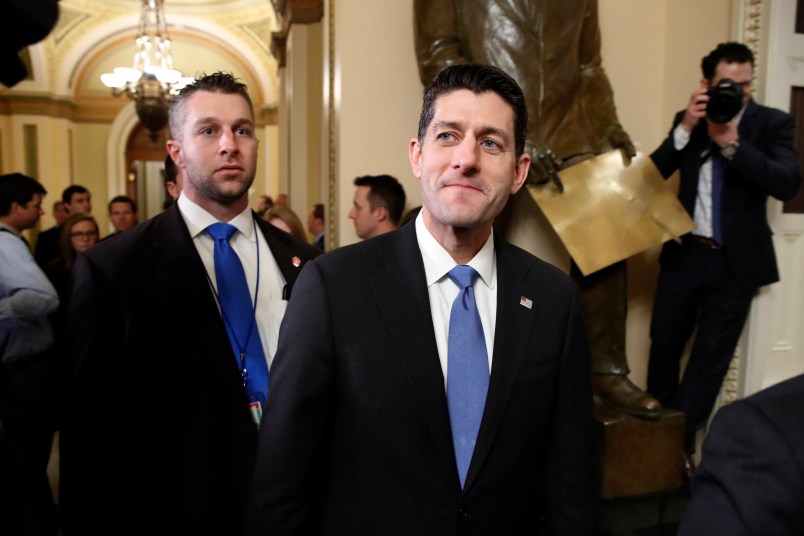I am not a fan of the new tax bill that the Republican Congress passed. It will widen the gap between the wealthy and everyone else and increase the likelihood over a decade or so of another crash. And it contains all kinds of unpleasant ancillary provisions, such as the one killing the Affordable Care Act’s mandate. But I don’t buy the argument – voiced by Democratic pundits, political consultants, and even a few economists – that the bill will doom the Republicans to defeat in 2018 and even 2020. Like many things I read or hear these days from liberals, it’s wish fulfillment disguised as analysis.
Democrats argue that the bill will be unpopular because it increases inequality by giving huge tax breaks to the rich and corporations. But most American voters don’t object to inequality and to the rich per se. (I wrote a long essay for TPM arguing this two years ago, and it was borne out in the 2016 election.) They object to inequality when a policy is so skewed that everything goes to the rich – when there is nothing in it for them. And they object to inequality when, as in 1932 or 2008, they see it conveying favor on a group that is responsible for wrecking the economy. But neither condition is likely to hold in this case.
The tax bill does give immediate benefits to the middle and lower classes. These include the increase in the child credit and standard deduction and lower rates. And while I think that in the long run, a tax cut that lavishly rewards the wealthy is likely to fuel speculation and destabilize the economy – as happened in the 1920s and in the period leading up to 2007-8 – it is likely in the short run, that is, during Donald Trump’s presidency, to prolong the recovery and hold off an eventual downturn. It will increase consumer demand, and its provisions lowering corporate tax rates and allowing businesses to expense expenditures are likely to boost investment, even if not as much as Trump and the Republicans claim. So I don’t think the Democrats will be able to blame the tax cut for a flagging economy.
While I was listening to the radio yesterday, I heard Democrats making several other arguments against the tax bill. They said it would increase the deficit and our dependence on the Chinese, who would have to purchase the debt. That’s never been a winning political argument, and I am not sure the economics makes a lot of sense either. Democrats also pointed out that the income tax cuts that would benefit the lower and middle classes expire in 2025 while the corporate tax cuts are permanent. Yes, that’s right, but we’re talking about the political effects in 2018 and 2020.
Some consultants also make a narrower argument that the tax bill’s limit on mortgage deductions and the deduction of state and local taxes will alienate upper income voters in states like New York, New Jersey and California that have high local and state taxes. True enough. I don’t think it’ll help in the big Senate races, which are not in high tax states, but it might turn a few House seats in vulnerable states the Democrats’ way. (That feature of the bill and the increase in the child credit point to the degree to which the Republicans tailored the tax bill to reflect the peculiar split in American politics – one in which the Democrats increasingly rely on upscale voters to win elections, while the Republicans appeal to working class voters who are more likely to have large families.)
Finally, I hear liberals and Democrats pointing to polls showing the tax bill is unpopular. I distrust these polls, especially when they concern voters’ opinion of a complex piece of legislation. Whether a policy is popular or not is usually settled during campaigns when the candidates try to interpret its results. What I am suggesting is that during the campaign next year, the Republicans will not be at a huge, or perhaps even a significant, disadvantage because they passed this bill. If the economy is still perking, they might even be able to turn the bill into a net political plus. That doesn’t mean they won’t be in trouble in 2018, but it does mean that they won’t be in trouble because of this bill.







